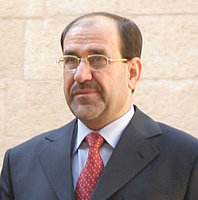Most coverage of the outcome of Iraq's March 7 elections has portrayed Prime Minister Nouri al-Maliki's re-election as seriously in doubt, with former Prime Minister Iyad Allawi, a secular Shiite, contending for the position. However, not only is another term for Maliki likely, his only real obstacle is securing Kurdish support. Allawi, on the other hand, does not represent a realistic threat. More generally, the election will result in a parliament that is more polarized between majority Shiite Islamists and opposition Sunni Arab nationalists, with secular Shiite and tribal parties almost entirely wiped out.
Although definitive tallies have not yet been released, a close reading of available region-by-region vote counts suggests that in a 325-seat parliament, Maliki's State of Law Coalition will have about 100 seats, Allawi's cross-sectarian bloc about 85, the Iranian-backed Iraqi National Alliance (INA) about 70, the Kurds 55, and other opposition parties about 10. Although Sunni Arab voters turned out well, Allawi will win less than 10 percent of the approximately 180 Shiite seats.
Once Maliki, as head of the largest bloc, becomes the prime minister-designate, a version of Prisoners' Dilemma will begin: While parties opposing Maliki could stop him if they all refused to join his government, once he starts offering choice ministries, the party receiving the offer will benefit more from accepting than from refusing.

